Robert Raymer's Blog, page 19
August 2, 2011
Mr. Penumbra--Another Writer Creates His Own Publishing Break
I love it when writers—instead of complaining about the state of flux the book publishing industry is and worried about where it's going—create their own breaks. Recently I blogged about the amazingly swift ride of
The Shack
from a homeless, self-published book to 15 million sales. Then today, following a lead on a publisher that still accepts unagented novels (hey, I got two agents reading two of them right now but it could takes months before they decide!), I came across Robin Sloan's short story "Mr. Penumbra's Twenty-Four-Hour Book Store". I dare you to read it right now and see if you're not impressed and richly rewarded—it's a fun read (you're pulled in fast), topical, mysterious (sorry no sex but it does lead to chance encounter that does lead to an actual date—we can imagine the rest), with plenty of clever wordplay by someone incredibly talented and confident and can pull it off. If you like books and bookstores this is for you. If you like what they do at Google (or have no idea—it's scary), that's in the story too . . . . Even Sherlock Holmes buffs will get a kick out of this – check out the buttons on the coat!
Robin Sloan not only got the short story selling on Kindle, he put it on Kickstarter (if you don't know what that is, check it out; a great concept like a start-up company with a guaranteed market-in-progress), and that led to an agent and a novel deal with Farrar Straus Giroux. I'm thinking, how he do all that so fast? This is like finding your way around one of those brick walls designed to stop people, as in Randy Pausch's The Last Lecture. If you're over 30 like me (inside joke from the story), it's about time we learn from those under 30 who are doing some amazing things on the internet and are getting their books published (and not just online). If we can't beat them (we'd look pretty silly trying), then join them. It's about time . . . before we get even older and start to all look alike (again from the story). This is also a way for us to achieve a type of immortality—yes, from the story. What can I say, been thinking about this story all day long and it's been a really busy day because tomorrow I'm going on vacation for a week!
So have fun, read it, read some of the comments, too (plenty of encouragement and helpful critiques), and start thinking about all the possibilities in your own writing. It all begins with a good character and a good story; and yes, just maybe the internet will help you achieve your dreams. But first, you got to do the hard work and write and then market what you write. (If no one is reading it or even knows it exists…) Learn from Robin. That's what I'm planning to do right now, starting with this blog post. (See I'm helping him out all the way from Borneo-- that's the internet!) He did get a book deal, right? And it's only the beginning for this story-cum-novel. It can be turned into a series, even something interactive. . . .There's only one way to find out what you can do with a good idea… let your imagination run with the possibilities for this story and your own. Let's see where you end up. Just maybe you can join their club and have your own published novel...
Robin Sloan not only got the short story selling on Kindle, he put it on Kickstarter (if you don't know what that is, check it out; a great concept like a start-up company with a guaranteed market-in-progress), and that led to an agent and a novel deal with Farrar Straus Giroux. I'm thinking, how he do all that so fast? This is like finding your way around one of those brick walls designed to stop people, as in Randy Pausch's The Last Lecture. If you're over 30 like me (inside joke from the story), it's about time we learn from those under 30 who are doing some amazing things on the internet and are getting their books published (and not just online). If we can't beat them (we'd look pretty silly trying), then join them. It's about time . . . before we get even older and start to all look alike (again from the story). This is also a way for us to achieve a type of immortality—yes, from the story. What can I say, been thinking about this story all day long and it's been a really busy day because tomorrow I'm going on vacation for a week!
So have fun, read it, read some of the comments, too (plenty of encouragement and helpful critiques), and start thinking about all the possibilities in your own writing. It all begins with a good character and a good story; and yes, just maybe the internet will help you achieve your dreams. But first, you got to do the hard work and write and then market what you write. (If no one is reading it or even knows it exists…) Learn from Robin. That's what I'm planning to do right now, starting with this blog post. (See I'm helping him out all the way from Borneo-- that's the internet!) He did get a book deal, right? And it's only the beginning for this story-cum-novel. It can be turned into a series, even something interactive. . . .There's only one way to find out what you can do with a good idea… let your imagination run with the possibilities for this story and your own. Let's see where you end up. Just maybe you can join their club and have your own published novel...
Published on August 02, 2011 05:59
July 26, 2011
The Shack, from Self-Published to 15 Million Copies Sold!
While browsing through the list of best-selling books of all time I came across a title that has sold 15 million copies since 2007, a title and author that I was unfamiliar with. Then I read that 26 publishers had turned it down, mostly for religious concerns I believe, so the author and two friends formed a publishing company, Windblown Media to sell this one book. That makes it a self-published book, whereby they invested a mere $200-300 to promote it via a website, and then, after a predicable slow start, the book took off by word of mouth, got picked up by a major publisher/distributer, and became the best-selling book of 2008 and one of the biggest best-selling books ever, and it's just getting started. (Give it another ten, twenty years and it's going to double, maybe triple that amount).
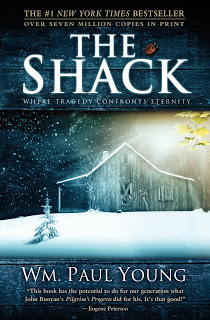 The book is The Shack by William Paul Young. To put this into perspective, the sales in four years are half of those for such behemoths as Margaret Mitchell's Gone with the Wind, published in 1936; Diary of Anne Frank, published in 1947; and one of my all time favorites Harper Lee's To Kill a Mockingbird, which was published in 1960, over 50 years ago! I wonder how The Shack will fair in fifty years? At the rate that it's going, and the controversy surrounding it—some are calling it heresay and already there are a couple of lawsuits between the author and its original publisher—it could even pull a Dan Brown's Da Vinci Code, which has sold an incredible 80 million copies in less than 10 years. Having a big court case that involves a book about some thorny religious issues always helps…
The book is The Shack by William Paul Young. To put this into perspective, the sales in four years are half of those for such behemoths as Margaret Mitchell's Gone with the Wind, published in 1936; Diary of Anne Frank, published in 1947; and one of my all time favorites Harper Lee's To Kill a Mockingbird, which was published in 1960, over 50 years ago! I wonder how The Shack will fair in fifty years? At the rate that it's going, and the controversy surrounding it—some are calling it heresay and already there are a couple of lawsuits between the author and its original publisher—it could even pull a Dan Brown's Da Vinci Code, which has sold an incredible 80 million copies in less than 10 years. Having a big court case that involves a book about some thorny religious issues always helps…
Intrigued, I went to the website, read about the author, who had never really published anything before, though he always saw himself as a writer, and had written stuff on his own, including short stories. In fact, he wrote The Shack not for publication but for his children (and a few close friends), at the urging of his wife (after the accidental shooting death of the counselor who turned the author's life around). He only made 15 copies.
Intrigued, I immediately read the forward from the website and right away I knew that I was about to read something special. It also posted the first chapter and I felt blown away by the writing, by its sense of being, sense of place; here I am in the tropics on the island of Borneo and I haven't felt that bitter coldness since I left Madison, Wisconsin and it all came back in a flash. It was that palpable, and reminded me once again why I moved here.
Although I found the print hard to read on my computer, the typeface so small and faint, I was too caught up in the story. I was hooked. My mind was immediately made up to buy this book this weekend; I was even tempted to order it on line, something I've never done before, or hop into my car and track it down today (I haven't ruled this out). I'm that eager to read the rest of the story.
For those who write, the publisher, Windblown Media, offers some advice to writers—this is from someone who walked their talk, took a self-published book to number one on the New York Times bestseller list. So follow their advice; I am. But do put all publishing agreements, even among friends, in writing.
I admit, while reading the opening to this book that I felt like I should throw in the towel as a writer. I know I can't touch this. But then an hour later I got an email from my French publisher about the ongoing post-translation corrections, and I thought, well yes, I too am a writer. Plus one of my own novels, The Resurrection of Jonathan Brady, just did pretty good in the Faulkner-Wisdom Novel contest, thus proving, once again, at least to myself, that I can write novels. My novel also tackles some thorny religious issues, like the resurrection, though maybe not in the edgy, hard hitting fashion of The Shack. Perhaps in the two follow up books, I should make them edgier and make them controversial, too. There is still a lot I need to learn, one of the reasons I'm so keen to read The Shack.
I know, as a writer, I may never have a book that will break out on the scale of The Shack or have the impact of To Kill a Mockingbird, but then so few writers have—see the above list for yourself! In fact, many of the best-selling books and best-selling series of books (see further down the list) are children's book! Not great literature by any means (especially books for pre-schoolers like Dr. Seuss's The Cat in the Hat, which I love. Yet there is no denying that these powerful so-called children stories will enchant and excite a child's heart, generation after generation, and show them what's possible in the world, and also show them that the real key to life is in their own hands, the gift of reading and the flight of imagination.
We as mere mortals, whether we are writing for children, writing for adults, writing for our own family and friends, or just blogging, must continue to do so, or how will be ever know if we can impact the world with our very own words? Who knows what will be in our future? There's no harm in trying, either. For me, The Shack gives me hope as a writer, and hope is always a good thing to have.
 The book is The Shack by William Paul Young. To put this into perspective, the sales in four years are half of those for such behemoths as Margaret Mitchell's Gone with the Wind, published in 1936; Diary of Anne Frank, published in 1947; and one of my all time favorites Harper Lee's To Kill a Mockingbird, which was published in 1960, over 50 years ago! I wonder how The Shack will fair in fifty years? At the rate that it's going, and the controversy surrounding it—some are calling it heresay and already there are a couple of lawsuits between the author and its original publisher—it could even pull a Dan Brown's Da Vinci Code, which has sold an incredible 80 million copies in less than 10 years. Having a big court case that involves a book about some thorny religious issues always helps…
The book is The Shack by William Paul Young. To put this into perspective, the sales in four years are half of those for such behemoths as Margaret Mitchell's Gone with the Wind, published in 1936; Diary of Anne Frank, published in 1947; and one of my all time favorites Harper Lee's To Kill a Mockingbird, which was published in 1960, over 50 years ago! I wonder how The Shack will fair in fifty years? At the rate that it's going, and the controversy surrounding it—some are calling it heresay and already there are a couple of lawsuits between the author and its original publisher—it could even pull a Dan Brown's Da Vinci Code, which has sold an incredible 80 million copies in less than 10 years. Having a big court case that involves a book about some thorny religious issues always helps… Intrigued, I went to the website, read about the author, who had never really published anything before, though he always saw himself as a writer, and had written stuff on his own, including short stories. In fact, he wrote The Shack not for publication but for his children (and a few close friends), at the urging of his wife (after the accidental shooting death of the counselor who turned the author's life around). He only made 15 copies.
Intrigued, I immediately read the forward from the website and right away I knew that I was about to read something special. It also posted the first chapter and I felt blown away by the writing, by its sense of being, sense of place; here I am in the tropics on the island of Borneo and I haven't felt that bitter coldness since I left Madison, Wisconsin and it all came back in a flash. It was that palpable, and reminded me once again why I moved here.
Although I found the print hard to read on my computer, the typeface so small and faint, I was too caught up in the story. I was hooked. My mind was immediately made up to buy this book this weekend; I was even tempted to order it on line, something I've never done before, or hop into my car and track it down today (I haven't ruled this out). I'm that eager to read the rest of the story.
For those who write, the publisher, Windblown Media, offers some advice to writers—this is from someone who walked their talk, took a self-published book to number one on the New York Times bestseller list. So follow their advice; I am. But do put all publishing agreements, even among friends, in writing.
I admit, while reading the opening to this book that I felt like I should throw in the towel as a writer. I know I can't touch this. But then an hour later I got an email from my French publisher about the ongoing post-translation corrections, and I thought, well yes, I too am a writer. Plus one of my own novels, The Resurrection of Jonathan Brady, just did pretty good in the Faulkner-Wisdom Novel contest, thus proving, once again, at least to myself, that I can write novels. My novel also tackles some thorny religious issues, like the resurrection, though maybe not in the edgy, hard hitting fashion of The Shack. Perhaps in the two follow up books, I should make them edgier and make them controversial, too. There is still a lot I need to learn, one of the reasons I'm so keen to read The Shack.
I know, as a writer, I may never have a book that will break out on the scale of The Shack or have the impact of To Kill a Mockingbird, but then so few writers have—see the above list for yourself! In fact, many of the best-selling books and best-selling series of books (see further down the list) are children's book! Not great literature by any means (especially books for pre-schoolers like Dr. Seuss's The Cat in the Hat, which I love. Yet there is no denying that these powerful so-called children stories will enchant and excite a child's heart, generation after generation, and show them what's possible in the world, and also show them that the real key to life is in their own hands, the gift of reading and the flight of imagination.
We as mere mortals, whether we are writing for children, writing for adults, writing for our own family and friends, or just blogging, must continue to do so, or how will be ever know if we can impact the world with our very own words? Who knows what will be in our future? There's no harm in trying, either. For me, The Shack gives me hope as a writer, and hope is always a good thing to have.
Published on July 26, 2011 18:32
July 17, 2011
The Novel Project: The Resurrection of Jonathan Brady Makes 2011 Faulkner-Wisdom Novel Contest short list!
While contemplating editing my novel The Lonely Affair of Jonathan Brady for the 2011 Faulkner-Wisdom Novel Contest, I got a flash of insight to change the title to The Resurrection of Jonathan Brady, and everything seemed to click. The title change made me think of the novel in a whole new light, especially him dying at the beginning as well as the ending. Besides giving the novel a new focus, the title doubled as a cool metaphor.
As I wrote about it in an earlier blog about making decisions, I hadn't worked on this novel in over a year in favor of two other novels that I rewrote for the 2011 Amazon Breakthrough Novel Award. But when the new title idea struck me in April, I knew it was time to act that very day. Although the novel was an almost-finalist for their 2008 contest, I wasn't sure if I had enough time for a full rewrite, other than a quick line-edit. I then got the news that the deadline, which had already been pushed back from 1 April to 1 May, just got pushed back to 15 May! So I went for it and it turned out to be a good decision!
My Penang novel, The Girl in the Bathtub, was also a short list finalist in the Novel-in-Progress category this year, while another Penang-set novel, The Expatriate's Choice, was a semi-finalist in the Novel category. Coincidently, I briefly met both judges, Will Murphy (Novel judge, Executive Editor at Random House) and the Jeff Kleinman (Novel-in-progress judge, the founding partner of Folio Literary Management) at the 2006 Maui Writers Conference. It's nice being able to put a face to a name; even nicer if one of my novels had made it to the finals for them to read. (Earlier this year a fourth novel, The Boy Who Shot Santa, had advanced to Round Two of the Amazon contest and was short listed in the 2009 Faulkner-Wisdom contest.) I know I'm close, though it's about time I found a publisher.
* Here's an updated link to the revamped first five pages of The Resurrection of Jonathan Brady.FINALISTS NOVEL William Faulkner - William Wisdom Creative Writing Competition
All in a Name
Bad of Country
Continuities
Echoes of Love and War
F-Train
The Water Master SHORT LIST
Aftermath, Laura Brlodie, Lexington, VA
All Jeweled Chokers, Helen Argers, Newark, NJ
Angels in the House, Marylee MacDonald, Tempe, AZ
Black Pearl, Arthur Nevis, Steamboat Springs, CO
Cooper's War, Tim Smith, Paris, France
Don't Cry Little Monster, Helen Krieger, New Orleans, LA
Flambeau, T. J. Fisher, New Orleans, LA
Habit, Adam Hungerford, Fairfax, VA
How to Make Moonshine, Jana Sasser, Edisto Island, SC
In the Evening, In the Morning, A. J. Harman, Arlington, VA
Jerusalem as a Second Language, Rochelle Distelheim, Highland Park, IL
Life Between Dreams, Tena Russ, Riverwoods, IL
Lucy, William Coles, Salt Lake City, UT
Memories of the Dust, Robert Wood, Chicago, IL
No, Heather Aimee O'Neill, Brooklyn, NY
Oleanna, Julie K. Rose, San Jose, CA
Playground, Edward Rowley, Glen Ridge, NJ
Practice Dying, Rachel Stolzman Gulla, Brooklyn, NY
Red Dirt, Joe Samuel Starnes, Philadelphia, PA
Rich, Martha L. Burns, La Luz, NM
Sea Level, Nancy Kilgore, Post Mills, VT
Stained Glass, Diane Manning, Houston, TX
The Edgartown Portraits, Richard Weber, Carouge, Switzerland
The Journal of Eva Hathaway, Maryanne D'Agincourt, Westwood, MA
The Patriot Joe Morton, Devault, Michael, Monroe, LA
The Principles of Mining, Sharon Thatcher & Wayland Stallard
The Resurrection of Jonathan Brady, Robert Raymer, Sarawak, Malaysia
This is Squalorville, Brian Schneider, St. Helen, MI
Various States of Undress, Roz Unruh, Hockessin, DE
Victor's Journals, Philip Erickson, St. Paul, MN
Warming Up, Mary Hutchins Reed, Chicago, IL
Watershed, Laura Lane McNeal, New Orleans, LA
Westminster, Diane Manning, Houston, TX —Robert Raymer, Borneo Expat Writer
As I wrote about it in an earlier blog about making decisions, I hadn't worked on this novel in over a year in favor of two other novels that I rewrote for the 2011 Amazon Breakthrough Novel Award. But when the new title idea struck me in April, I knew it was time to act that very day. Although the novel was an almost-finalist for their 2008 contest, I wasn't sure if I had enough time for a full rewrite, other than a quick line-edit. I then got the news that the deadline, which had already been pushed back from 1 April to 1 May, just got pushed back to 15 May! So I went for it and it turned out to be a good decision!
My Penang novel, The Girl in the Bathtub, was also a short list finalist in the Novel-in-Progress category this year, while another Penang-set novel, The Expatriate's Choice, was a semi-finalist in the Novel category. Coincidently, I briefly met both judges, Will Murphy (Novel judge, Executive Editor at Random House) and the Jeff Kleinman (Novel-in-progress judge, the founding partner of Folio Literary Management) at the 2006 Maui Writers Conference. It's nice being able to put a face to a name; even nicer if one of my novels had made it to the finals for them to read. (Earlier this year a fourth novel, The Boy Who Shot Santa, had advanced to Round Two of the Amazon contest and was short listed in the 2009 Faulkner-Wisdom contest.) I know I'm close, though it's about time I found a publisher.
* Here's an updated link to the revamped first five pages of The Resurrection of Jonathan Brady.FINALISTS NOVEL William Faulkner - William Wisdom Creative Writing Competition
All in a Name
Bad of Country
Continuities
Echoes of Love and War
F-Train
The Water Master SHORT LIST
Aftermath, Laura Brlodie, Lexington, VA
All Jeweled Chokers, Helen Argers, Newark, NJ
Angels in the House, Marylee MacDonald, Tempe, AZ
Black Pearl, Arthur Nevis, Steamboat Springs, CO
Cooper's War, Tim Smith, Paris, France
Don't Cry Little Monster, Helen Krieger, New Orleans, LA
Flambeau, T. J. Fisher, New Orleans, LA
Habit, Adam Hungerford, Fairfax, VA
How to Make Moonshine, Jana Sasser, Edisto Island, SC
In the Evening, In the Morning, A. J. Harman, Arlington, VA
Jerusalem as a Second Language, Rochelle Distelheim, Highland Park, IL
Life Between Dreams, Tena Russ, Riverwoods, IL
Lucy, William Coles, Salt Lake City, UT
Memories of the Dust, Robert Wood, Chicago, IL
No, Heather Aimee O'Neill, Brooklyn, NY
Oleanna, Julie K. Rose, San Jose, CA
Playground, Edward Rowley, Glen Ridge, NJ
Practice Dying, Rachel Stolzman Gulla, Brooklyn, NY
Red Dirt, Joe Samuel Starnes, Philadelphia, PA
Rich, Martha L. Burns, La Luz, NM
Sea Level, Nancy Kilgore, Post Mills, VT
Stained Glass, Diane Manning, Houston, TX
The Edgartown Portraits, Richard Weber, Carouge, Switzerland
The Journal of Eva Hathaway, Maryanne D'Agincourt, Westwood, MA
The Patriot Joe Morton, Devault, Michael, Monroe, LA
The Principles of Mining, Sharon Thatcher & Wayland Stallard
The Resurrection of Jonathan Brady, Robert Raymer, Sarawak, Malaysia
This is Squalorville, Brian Schneider, St. Helen, MI
Various States of Undress, Roz Unruh, Hockessin, DE
Victor's Journals, Philip Erickson, St. Paul, MN
Warming Up, Mary Hutchins Reed, Chicago, IL
Watershed, Laura Lane McNeal, New Orleans, LA
Westminster, Diane Manning, Houston, TX —Robert Raymer, Borneo Expat Writer
Published on July 17, 2011 01:14
July 13, 2011
Rainforest World Music Festival 2011—8-10 July
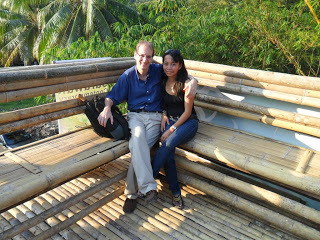 Robert and JennyFor the past six years, since 2006, Jenny and I have been coming to the Rainforest World Music Festival, in Santubong, 31km from Kuching, Sarawak. My friend Rob, who I briefly met at the 2006 MELTA conference in Kuching only the month before, invited us to join him, and he showed us the ropes. First thing you do, you head to where the concert will be held that night and stake out your ground with a mat or canvas, then plan out which of the three workshops you want to visit for each of the three sessions, held in separate venues, and then you're on your own. True to his word we never saw Rob again until that evening, but oh it was a relief to have a friend in that crowd of over 10,000 people meeting us exactly where he said he would be. We've been staking our ground ever since.
Robert and JennyFor the past six years, since 2006, Jenny and I have been coming to the Rainforest World Music Festival, in Santubong, 31km from Kuching, Sarawak. My friend Rob, who I briefly met at the 2006 MELTA conference in Kuching only the month before, invited us to join him, and he showed us the ropes. First thing you do, you head to where the concert will be held that night and stake out your ground with a mat or canvas, then plan out which of the three workshops you want to visit for each of the three sessions, held in separate venues, and then you're on your own. True to his word we never saw Rob again until that evening, but oh it was a relief to have a friend in that crowd of over 10,000 people meeting us exactly where he said he would be. We've been staking our ground ever since. 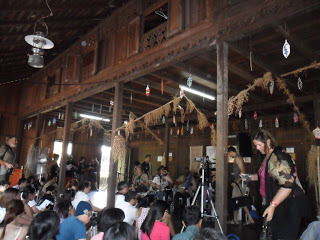 Iban Longhouse, Cultural VillageFor me the best part of the RWMF, other than the beautiful Cultural Village setting, a must see in itself, are the workshops, where the musicians from various acts introduce their instruments and their playing style and then jam together, especially in the intimate setting of the Iban Longhouse. They're up close and personal, especially if you arrive early. Here is a different angle (and a much better photo) from last year, if you follow this link about the RWMF and scroll down to the third photo (you'll see Jenny and I sitting between the first two pillars—I'm wearing white)
Iban Longhouse, Cultural VillageFor me the best part of the RWMF, other than the beautiful Cultural Village setting, a must see in itself, are the workshops, where the musicians from various acts introduce their instruments and their playing style and then jam together, especially in the intimate setting of the Iban Longhouse. They're up close and personal, especially if you arrive early. Here is a different angle (and a much better photo) from last year, if you follow this link about the RWMF and scroll down to the third photo (you'll see Jenny and I sitting between the first two pillars—I'm wearing white)  Leweton Woman's Water MusicAlthough spread over three days, this year we only came on Saturday, and left our two boys at home partly due to their recent operation (circumcision) For the first workshop we chose to see "flying fingers" at Dewan Lagenda (some hilarious miscommunication with the local Sape Masters), which was enjoyable. Then "Blown Away" at Iban Longhouse (although it had its moments, the musicians failed to jell and we bailed out early) to get a good spot for an special extra session, a unique treat, the Leweton Woman's Water Music, where six women from Vanuatu created some amazing sounds with their hands splashing waist high in the lake. You would've sworn that they had drums in that water! Then back to Dewan Lagenda for "the rhythm method". You can rarely go wrong with percussionists—they know how to get down and get all of us dancing with Max Singh of Kissmet and Raul Villa of Joaquin Diaz leading the way.
Leweton Woman's Water MusicAlthough spread over three days, this year we only came on Saturday, and left our two boys at home partly due to their recent operation (circumcision) For the first workshop we chose to see "flying fingers" at Dewan Lagenda (some hilarious miscommunication with the local Sape Masters), which was enjoyable. Then "Blown Away" at Iban Longhouse (although it had its moments, the musicians failed to jell and we bailed out early) to get a good spot for an special extra session, a unique treat, the Leweton Woman's Water Music, where six women from Vanuatu created some amazing sounds with their hands splashing waist high in the lake. You would've sworn that they had drums in that water! Then back to Dewan Lagenda for "the rhythm method". You can rarely go wrong with percussionists—they know how to get down and get all of us dancing with Max Singh of Kissmet and Raul Villa of Joaquin Diaz leading the way.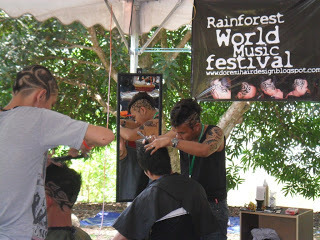 Haircuts at Rainforest World Music FestivalEarlier, prior to the workshops, to beat the crowd later, (instead of getting fancy haircuts)Jenny and I visited the Rainforest World Craft Bazaar, where Jenny bought a few necklaces, and I bought one as a house decoration. We also met several friends including Lesley and Aidan, and Lynn. This is one of the cool things about coming here, the friends you meet. In fact, on the way home after our first visit, we met Martin from Editions Didier Millet who was also there. We exchanged business cards, then hooked up again a couple of years later on Facebook, and then he contacted me in 2010 and asked me to write the text for
Spirit of Malaysia
which came out in February 2011.
Haircuts at Rainforest World Music FestivalEarlier, prior to the workshops, to beat the crowd later, (instead of getting fancy haircuts)Jenny and I visited the Rainforest World Craft Bazaar, where Jenny bought a few necklaces, and I bought one as a house decoration. We also met several friends including Lesley and Aidan, and Lynn. This is one of the cool things about coming here, the friends you meet. In fact, on the way home after our first visit, we met Martin from Editions Didier Millet who was also there. We exchanged business cards, then hooked up again a couple of years later on Facebook, and then he contacted me in 2010 and asked me to write the text for
Spirit of Malaysia
which came out in February 2011.Every year since then we have run into friends and former USM students from Penang (and from UNIMAS, too). One year, my friend Earl was making an educational tour through the region on behalf of Brigham Young University-Hawaii. I had met him at a conference in Penang in 2004, visited him in 2006 at his university in Hawaii prior to the Maui Writers Conference. Now he was returning the favor with a visit to Kuching. I told him about the RWMF, which he would just be missing by a few days and asked if he could rearrange his schedule, a major ordeal since he had all these meetings arranged in several countries, but he managed to pull it off. The very next year, the first person we ran into at the RWMF was Earl. He had enjoyed it so much; he came back on his own. We've been sharing our mat with others nearly every year since then, following up on Rob's hospitality our first visit.
 Returning to our mat, we settled back to an enjoyable evening of music that rotated between two stages (hence our choice where to sit with some covering in case of rain). First up was The Shin from the country Georgia—we were mesmerized not only by their music but by the dancing of one of its members. Next up was the Pacific Curls from New Zealand, three ladies who played 13 instruments. Ilgi from Latvia was next, followed by Paddy Keenan from Ireland, who interestingly did a beautiful rendition of "Midnight Train to Georgia". Next was Warsaw Village Band from Poland, Joaquin Diaz from Dominican Republic and Lisa Haley & Zydekats from USA. Quite a varied international line up, as you can see. Unfortunately, we had to leave early since we had a long drive ahead of us. But we'll be back next year. After that first taste in 2006, we vowed never to miss it again.
Returning to our mat, we settled back to an enjoyable evening of music that rotated between two stages (hence our choice where to sit with some covering in case of rain). First up was The Shin from the country Georgia—we were mesmerized not only by their music but by the dancing of one of its members. Next up was the Pacific Curls from New Zealand, three ladies who played 13 instruments. Ilgi from Latvia was next, followed by Paddy Keenan from Ireland, who interestingly did a beautiful rendition of "Midnight Train to Georgia". Next was Warsaw Village Band from Poland, Joaquin Diaz from Dominican Republic and Lisa Haley & Zydekats from USA. Quite a varied international line up, as you can see. Unfortunately, we had to leave early since we had a long drive ahead of us. But we'll be back next year. After that first taste in 2006, we vowed never to miss it again.
Published on July 13, 2011 00:09
June 29, 2011
A Hospital Adventure for my Two Boys and a Writing Break for Me
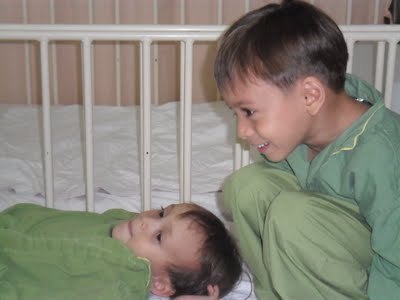 Justin and Jason Raymer at hospitalI recently blogged about my creative writing workshop with nurses and found myself surrounded by nurses thanks to my two boys, Jason and Justin, ages 7 and 4 ½. On Monday we got a call from the hospital informing us of two cancellations so their circumcision operation could be moved ahead by two months, but we had to confirm right now and be at the hospital before 3pm. The time was 11:30. My brain raced back and forth. I would have to drop everything for at least two days, grab a quick lunch, pack for the boys and me (to spend the night with them at the hospital), pick them up from the school and then race to the hospital (the driving alone will consume 1½ hours).
Justin and Jason Raymer at hospitalI recently blogged about my creative writing workshop with nurses and found myself surrounded by nurses thanks to my two boys, Jason and Justin, ages 7 and 4 ½. On Monday we got a call from the hospital informing us of two cancellations so their circumcision operation could be moved ahead by two months, but we had to confirm right now and be at the hospital before 3pm. The time was 11:30. My brain raced back and forth. I would have to drop everything for at least two days, grab a quick lunch, pack for the boys and me (to spend the night with them at the hospital), pick them up from the school and then race to the hospital (the driving alone will consume 1½ hours).I hurriedly grabbed what I could think of and off we were. After registering the boys at the hospital for admittance, we got lost several times en route to the children's surgical ward, when hospital administration and nurses and some helpful people gave us conflicting directions. We ended up on the fourth floor of the wrong building. I felt frustrated since it was nearly 3, then I thought, wait a minute, this is good. We've been in Kuching nearly five years, with two small boys and we weren't familiar with the General Hospital! In all that time, we have only been there once for Jason (but not admitted) and once or twice as visitors. Justin had been born in a different hospital and we've never been back.
No sooner had I got the boys settled into their ward and the boys in their green gowns, and in beds placed side by side, interns came by, one after the other, and asked all the same questions that the registration nurse had already asked and written down in their files. I got the feeling they were "playing" doctor by going through the motions, but this is probably how they learn and assist the attending doctors, who would later come around making their rounds, with an entourage of six or seven interns.
Meanwhile, I was distracted by my perfectly healthy, rambunctious pre-surgery boys who were enjoying this new adventure (as I had dubbed it when I first picked them up). They kept climbing back and forth like green monkeys raiding each other's bed. I was hoping to get some writing and reading done, but I was kept busy fielding questions from the doctors and nurses and minding the boys, hoping to prevent them from getting in the way of the doctors and nurses and other patients, mostly babies and toddlers.
It takes a trip to the hospital, especially the children's ward, to bring some humility into your life and to appreciate your own healthy children. One, a preemie, had been in the ward for two months since his birth due to several complications; another, has been there for two years, in and out of surgery for intestinal problems. One toddler had a growth on the back of his head that had to be removed; another had half of his face pinned beneath a tire, as his father backed up the car, unaware that the child was behind him. You couldn't tell it from the way the toddler—who arrived a day after us—kept running around, happily playing, not a care in the world.
Luckily for Jason and Justin, the ward had a playroom, so they could play there, instead of chasing one another and making a nuisance of themselves. After a fitful night of sleep—nurses kept waking me to ask more questions about the boys—and then dealing with a hostile Justin who was angry at me because I wouldn't let him eat. They needed to fast before their surgery.
 Justin just prior to surgeryJustin's turn came first, and he was quite calm, no doubt a little scared, as I accompanied him into the surgery room and watched as they put him under. I kissed him just before he passed out, and then waited outside.
Justin just prior to surgeryJustin's turn came first, and he was quite calm, no doubt a little scared, as I accompanied him into the surgery room and watched as they put him under. I kissed him just before he passed out, and then waited outside. They called me back in and Justin was still out, but then he suddenly woke up, in a dreamy, yet violent state, attacking me while I tried to console him, wary of his sensitive area that had just being operated on. They told me this was common and had to sedate him. When he later woke up again, the real Justin showed up and all was calm, until we got him back to bed and Jason saw what they did to his brother. First he hid under the bed, and then he locked himself in the bathroom. He shouted and fought with me all the way as I struggled to carry him to surgery. He regarded me as traitor, and I felt bad because I wasn't on his side; I was preventing him from escaping. His mother accompanied him to surgery and waited for him while I went back to attend to Justin.
That evening, I was hoping they would release us since there were no complications, but because we lived so far from the hospital, they recommended another night for us, in case of a middle-of-the-night emergency. Since we already knew the routine, and since the boys were in some pain, there was no more running around or climbing in and out of the beds, I agreed. I brought some toys for them from the playroom and even got some work done.
I have to admit, the hospital break did me some good. It not only gave me a chance to put my writing life into perspective, it allowed me to be there for my two boys when they needed me the most. So now I'm back home, blogging about this (and feeling a little guilty I'm not doing something else that's a little more pressing), while the two boys happily run around without any pants. They'll be doing this all week, comparing their you-know-what to see who got the worst deal from their adventure at the hospital. -Borneo Expat Writer
Published on June 29, 2011 06:42
June 25, 2011
Congrats to Yvonne Lee; Congrats to All Nominated Writers and Models!
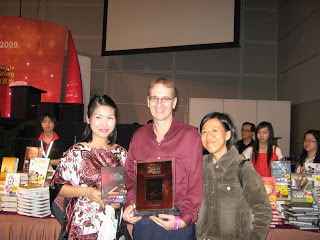 Yvonne Lee, Robert Raymer, and Adeline LohCongrats to Yvonne Lee Shu Yee, whom I blogged about in Got Some Writer Envy. Not only is her latest book Madness Aboard, the long awaited follow up to The Sky is Crazy, nominated for the 2011 Popular Star Reader's Choice Award, she's also a semi-finalists in the Estée Lauder Model Search2011. Check out her photo, next to last row, at left, and feel free to vote for her.
Yvonne Lee, Robert Raymer, and Adeline LohCongrats to Yvonne Lee Shu Yee, whom I blogged about in Got Some Writer Envy. Not only is her latest book Madness Aboard, the long awaited follow up to The Sky is Crazy, nominated for the 2011 Popular Star Reader's Choice Award, she's also a semi-finalists in the Estée Lauder Model Search2011. Check out her photo, next to last row, at left, and feel free to vote for her. Recently Yvonne was interviewed on TV twice in Singapore and she's featured in the current issue of Quill (April-June 2011). So she's more than just a pretty face--she knows how to write and she knows how to market herself!
Congrats to all nominated writers and nominated models! May 2011 be your year!
Published on June 25, 2011 04:29
June 24, 2011
Editing the French Translation of Lovers and Strangers Revisited, a Whole New Experience
Just had my first interview translated into French, due out after Trois autres Malaisie is published. Now I'm finding working with the French publisher Éditions GOPE over revising Trois autres Malaisie, the French translation of Lovers and Strangers Revisited, a whole new experience, but not in the way that I was expecting. Over the years, I've worked with four editors on the previous versions of Lovers and Strangers Revisited (Heinemann Asia, Silverfish, MPH, plus the editor I hired when I decided to revisit the stories), and all of the previous editors concentrated mostly on grammar and story clarity to make sure it's clear what's going on in the story.
But this time around, there are new considerations. Other than idioms that rarely make any sense if you translate them literally, the questions I'm getting are mainly about culture or physical details peculiar to Malaysia or even Southeast Asia . Unlike the previous editors and even the French translator Jerome Bouchaud, who have all lived in Malaysia or Singapore, the French publisher/editor that I'm now working with does not, so many of the questions have been about Malaysian itself.
If a wrong assumption is made, as was pointed out to me from the onset, then the French translation or any editing changes based on that assumption, will be wrong and it will affect a scene, or how the reader will interpret what's going on.
For example, in "Mat Salleh" and "Smooth Stones" I had to clarify if a woven mat, often made from rattan, reeds or pandan leaves, was a carpet or a rug, or if the side steps and back steps were stairs or ladders since the words are different in French. The best way to describe them, as I did on page 124 in "Mat Salleh", is "ladder-like wooden steps". This seems apt. They requested a photo so I pulled up a sample from wikipedia (I showed them samples of the mats, too). The house I'm describing has a totally different front steps, which are in fact stairs, and a proper verandah, but it gives them a better idea as to what I'm actually describing so they don't make any wrong assumptions.
Also in "Smooth Stones" I had to clarify as to how some Malay fishermen fish, or why the character Omar is slapping the water with the bamboo pole while fishing. If the French editor is picturing in his mind a bamboo fishing pole instead of merely a bamboo pole, then slapping the water doesn't make any sense; it will only scare away the fish, thus he won't catch any. But in this case, Omar is slapping the water not with a fishing pole but just a bamboo pole to drive the fish in the opposite direction, toward the net that the other fishermen are holding.
When translating, and especially when editing what's been translated, it's important not just to look at the original text in English, but also not to make any cross-cultural assumptions. The last thing a writer needs are errors of any kind to be introduced into the text. So far that's not happening because they're not making those assumptions, they're asking me to clarify, just to make sure they got it right (or not) and I'm so glad, because once the story goes into French, I'm clueless. I won't be able to catch those mistakes, but the readers sure will, especially those readers in French who are familiar with Malaysia.
Here's the link to the French blog
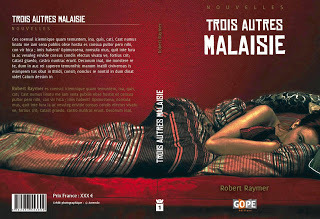

But this time around, there are new considerations. Other than idioms that rarely make any sense if you translate them literally, the questions I'm getting are mainly about culture or physical details peculiar to Malaysia or even Southeast Asia . Unlike the previous editors and even the French translator Jerome Bouchaud, who have all lived in Malaysia or Singapore, the French publisher/editor that I'm now working with does not, so many of the questions have been about Malaysian itself.
If a wrong assumption is made, as was pointed out to me from the onset, then the French translation or any editing changes based on that assumption, will be wrong and it will affect a scene, or how the reader will interpret what's going on.
For example, in "Mat Salleh" and "Smooth Stones" I had to clarify if a woven mat, often made from rattan, reeds or pandan leaves, was a carpet or a rug, or if the side steps and back steps were stairs or ladders since the words are different in French. The best way to describe them, as I did on page 124 in "Mat Salleh", is "ladder-like wooden steps". This seems apt. They requested a photo so I pulled up a sample from wikipedia (I showed them samples of the mats, too). The house I'm describing has a totally different front steps, which are in fact stairs, and a proper verandah, but it gives them a better idea as to what I'm actually describing so they don't make any wrong assumptions.
Also in "Smooth Stones" I had to clarify as to how some Malay fishermen fish, or why the character Omar is slapping the water with the bamboo pole while fishing. If the French editor is picturing in his mind a bamboo fishing pole instead of merely a bamboo pole, then slapping the water doesn't make any sense; it will only scare away the fish, thus he won't catch any. But in this case, Omar is slapping the water not with a fishing pole but just a bamboo pole to drive the fish in the opposite direction, toward the net that the other fishermen are holding.
When translating, and especially when editing what's been translated, it's important not just to look at the original text in English, but also not to make any cross-cultural assumptions. The last thing a writer needs are errors of any kind to be introduced into the text. So far that's not happening because they're not making those assumptions, they're asking me to clarify, just to make sure they got it right (or not) and I'm so glad, because once the story goes into French, I'm clueless. I won't be able to catch those mistakes, but the readers sure will, especially those readers in French who are familiar with Malaysia.
Here's the link to the French blog

Published on June 24, 2011 08:24
Being Edited in French, a New Experience
Just had my first interview translated into French, due out after Trois autres Malaisie is published. Now I'm finding working with the French publisher Éditions GOPE over revising Trois autres Malaisie, the French translation of Loversand Strangers Revisited, a whole new experience, but not in the way that I was expecting. Over the years, I've worked with four editors on the previous versions of Lovers and Strangers Revisited (Heinemann Asia, Silverfish, MPH, plus the editor I hired when I decided to revisit the stories), and all of the previous editors concentrated mostly on grammar and story clarity to make sure it's clear what's going on in the story.
But this time around, there are new considerations. Other than idioms that rarely make any sense if you translate them literally, the questions I'm getting are mainly about culture. Unlike the previous editors and even the French translator Jerome Bouchaud, who have all lived in Malaysia or Singapore, the French publisher/editor that I'm now working with does not, so many of the questions have been about the Malaysian culture.
If a wrong assumption is made, as was pointed out to me from the onset, then the French translation or any editing changes based on that assumption, will be wrong and it will affect a scene, or how the reader will interpret what's going on.
For example, in "Smooth Stones" I had to clarify as to how some Malay fishermen fish, or why the character Omar is slapping the water with the bamboo pole while fishing. It didn't make sense. If the French editor is picturing in his mind a bamboo fishing pole instead of merely a bamboo pole, then slapping the water doesn't make any sense; it will only scare away the fish, thus he won't catch any. But in this case, Omar is slapping the water not with a fishing pole but just a bamboo pole to drive the fish in the opposite direction, toward the net that the other fishermen are holding.
When translating, and especially when editing what's been translated, it's important not just to look at the original text in English, but also not to make any cross-cultural assumptions. The last thing a writer needs are errors of any kind to be introduced into the text. So far that's not happening because they're not making those assumptions, they're asking me to clarify, just to make sure they got it right (or not) and I'm so glad, because once the story goes into French, I'm clueless. I won't be able to catch those mistakes, but the readers sure will, especially those readers in French who are familiar with Malaysia.
Here's the link to the French blog


But this time around, there are new considerations. Other than idioms that rarely make any sense if you translate them literally, the questions I'm getting are mainly about culture. Unlike the previous editors and even the French translator Jerome Bouchaud, who have all lived in Malaysia or Singapore, the French publisher/editor that I'm now working with does not, so many of the questions have been about the Malaysian culture.
If a wrong assumption is made, as was pointed out to me from the onset, then the French translation or any editing changes based on that assumption, will be wrong and it will affect a scene, or how the reader will interpret what's going on.
For example, in "Smooth Stones" I had to clarify as to how some Malay fishermen fish, or why the character Omar is slapping the water with the bamboo pole while fishing. It didn't make sense. If the French editor is picturing in his mind a bamboo fishing pole instead of merely a bamboo pole, then slapping the water doesn't make any sense; it will only scare away the fish, thus he won't catch any. But in this case, Omar is slapping the water not with a fishing pole but just a bamboo pole to drive the fish in the opposite direction, toward the net that the other fishermen are holding.
When translating, and especially when editing what's been translated, it's important not just to look at the original text in English, but also not to make any cross-cultural assumptions. The last thing a writer needs are errors of any kind to be introduced into the text. So far that's not happening because they're not making those assumptions, they're asking me to clarify, just to make sure they got it right (or not) and I'm so glad, because once the story goes into French, I'm clueless. I won't be able to catch those mistakes, but the readers sure will, especially those readers in French who are familiar with Malaysia.
Here's the link to the French blog

Published on June 24, 2011 08:24
June 23, 2011
He Who Asks Questions Cannot Avoid the Answers
Lately I've been asking myself a lot of questions and that's a good thing. According to a Cameroon Proverb "He who asks questions cannot avoid the answers." I've even started a Question Asking notebook and have been impressed with the results, coming up with answers and solutions to problems that eluded me in the past,. Now they seemed to have been there all along just waiting for me to ask the right questions.
In Anthony Robbins' Awaken the Giant Within he writes, "I realized that the main difference between the people who seemed to be successful—in any area—and those who weren't was that successful people asked better questions, and as a result got better answers." He lists seven Morning Power Questions to get your day started on the right foot and three Evening Power Questions: The Morning Power QuestionsOur life experience is based on what we focus on. The following questions are designed to cause you to experience more happiness, excitement, pride, gratitude, joy, commitment and love every day of your life. Remember, quality questions create a quality life.
Come up with two or three answers to all of these questions and feel fully associated. If you have difficulty discovering an answer simply add the word "could". Example: "What could I be most happy about in my life now?"
What am I happy about in my life now?
What about that makes me happy? How does that make me feel? What am I excited about in my life now?
What about that makes me excited? How does that make me feel? What am I proud about in my life now?
What about that makes me proud? How does that make me feel? What am I grateful about in my life now?
What about that makes me grateful? How does that make me feel? What am I enjoying in my life right now?
What about that do I enjoy? How does that make me feel? What am I committed to in my life right now?
What about that makes me committed? How does that make me feel?Who do I love? Who loves me?
What about that makes me loving? How does that make me feel? Evening Power Questions
What have I given today?
In what ways have I been a giver today? What did I learn today? How has today added to the quality of my life or how can I use today as an investment in my future?Plus here are five Problem-Solving Questions:
Problem Solving Questions
What is great about this problem? What is not perfect yet? What am I willing to do to make it the way I want it? What am I willing no longer to do in order to make it the way I want it? How can I enjoy the process while I do what is necessary to make it the way I want it?Copyright © 1992, Anthony Robbins
They say, ask and you shall receive. Seek and you shall find….That is what I've been doing lately, asking myself a whole lot of questions and seeking the answers from within through the guidance of some pretty smart people. So, when was the last time you asked yourself a really good question and taken the time to write out your answer? Questions often lead to decisions. And making decisions is not a bad way to start your day.
In Anthony Robbins' Awaken the Giant Within he writes, "I realized that the main difference between the people who seemed to be successful—in any area—and those who weren't was that successful people asked better questions, and as a result got better answers." He lists seven Morning Power Questions to get your day started on the right foot and three Evening Power Questions: The Morning Power QuestionsOur life experience is based on what we focus on. The following questions are designed to cause you to experience more happiness, excitement, pride, gratitude, joy, commitment and love every day of your life. Remember, quality questions create a quality life.
Come up with two or three answers to all of these questions and feel fully associated. If you have difficulty discovering an answer simply add the word "could". Example: "What could I be most happy about in my life now?"
What am I happy about in my life now?
What about that makes me happy? How does that make me feel? What am I excited about in my life now?
What about that makes me excited? How does that make me feel? What am I proud about in my life now?
What about that makes me proud? How does that make me feel? What am I grateful about in my life now?
What about that makes me grateful? How does that make me feel? What am I enjoying in my life right now?
What about that do I enjoy? How does that make me feel? What am I committed to in my life right now?
What about that makes me committed? How does that make me feel?Who do I love? Who loves me?
What about that makes me loving? How does that make me feel? Evening Power Questions
What have I given today?
In what ways have I been a giver today? What did I learn today? How has today added to the quality of my life or how can I use today as an investment in my future?Plus here are five Problem-Solving Questions:
Problem Solving Questions
What is great about this problem? What is not perfect yet? What am I willing to do to make it the way I want it? What am I willing no longer to do in order to make it the way I want it? How can I enjoy the process while I do what is necessary to make it the way I want it?Copyright © 1992, Anthony Robbins
They say, ask and you shall receive. Seek and you shall find….That is what I've been doing lately, asking myself a whole lot of questions and seeking the answers from within through the guidance of some pretty smart people. So, when was the last time you asked yourself a really good question and taken the time to write out your answer? Questions often lead to decisions. And making decisions is not a bad way to start your day.
Published on June 23, 2011 06:41
June 19, 2011
"Home for Hari Raya" finds a home in Turkey
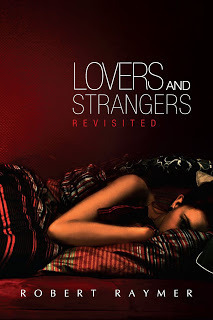 I know it's two months early for Hari Raya here in Malaysia, but my short story "Home for Hari Raya" from Lovers and Strangers Revisited (MPH 2008) has just been published in
Istanbul Literary Review
, the book's 80th short story publication. Turkey has become the twelfth country that one of the stories from this collection has now appeared.
I know it's two months early for Hari Raya here in Malaysia, but my short story "Home for Hari Raya" from Lovers and Strangers Revisited (MPH 2008) has just been published in
Istanbul Literary Review
, the book's 80th short story publication. Turkey has become the twelfth country that one of the stories from this collection has now appeared.Of course, come August that number will take a spike when Lovers and Strangers Revisited gets published as Trois autres Malaisie by French publisher Éditions GOPE. The collection will then appear in about a half dozen countries, several in Europe will be new. That number will steadily grow as the stories reach other French speaking countries, or countries that have a large French speaking population to warrant either a French bookstore or a French section of a bookstore like the one in Singapore that has already pre-ordered the book as I blogged about earlier this month in gearing up for the French
Now that the translation has been completed by Jerome Bouchaud, author of Malaisie - Modernité et Traditions en Asie du Sud-Est, whom I met recently in Kuching, the publisher has begun the editing process. They're also comparing the translation with the original, and that brings me back involved in the process. Initially, I revised all of the stories before passing them along for the translation, and now I'm answering questions about the English text to ensure the accuracy of the translation. For example, I had to clarify in "Mat Salleh" if the "outhouse" that I mentioned in back of the kampong house was in fact a toilet or a wooden shed.
After reading "Home for Hari Raya", here's the storybehind the story. Wishing all those who celebrate Hari Raya, a two-month early Selamat Hari Raya! By the time Hari Raya does come, those who read French can read the story in French for a fascinating cross-cultural experience.
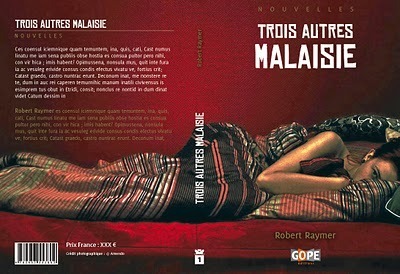 *Here's the link to the French blog for Trois autres Malaisie
*Here's the link to the French blog for Trois autres Malaisie
Published on June 19, 2011 07:04
Robert Raymer's Blog
- Robert Raymer's profile
- 3 followers
Robert Raymer isn't a Goodreads Author
(yet),
but they
do have a blog,
so here are some recent posts imported from
their feed.



